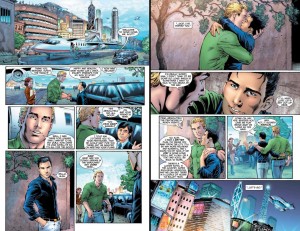LOS ANGELES, CA – On June 1, Los Angeles Mayor Antonio Villaraigosa commemorated the city’s second annual LGBT Heritage Month with a ceremony inside the Los Angeles City Council Chambers, held to honor actor and longtime LGBT political activist George Takei, along with other area LGBT community leaders. Takei, who played Lt. Sulu on the television sci-fi classic from 1966 to 1969, commemorated his honor by planting a kiss on Mayor Villaraigosa’s cheek.
Carrie Underwood Endorses Marriage Equality
NASHVILLE, TN – American Idol winner and country superstar Carrie Underwood told the British newspaper the Independent this week that she and husband Mike Fisher attend a gay-friendly church in Nashville, and that she supports marriage equality for LGBT persons.
“As a married person myself, I don’t know what it’s like to be told I can’t marry somebody I love, and want to marry. I can’t imagine how that must feel,” Underwood told the British publication. “I definitely think we should all have the right to love, and love publicly, the people that we want to love.”
“Above all, God wanted us to love others,” the fourth season American Idol champion and Oklahoma native added. “It’s not about setting rules, or [saying] ‘everyone has to be like me’. No. We’re all different. That’s what makes us special. We have to love each other and get on with each other.”
Last month, “out” country artist Chely Wright told “CBS This Morning” that her coming out two years ago has resulted in her experiencing a “freeze” and a “rejection of silence” from the big names in country music. “I need a country artist who is a big deal, like Jay-Z in his community—he came forward and said, ‘I believe in equality for all,’” Wright said during the May 30 segment.
DC Comics “Outs” Green Lantern
NEW YORK, NY – The publishers of “Superman,” “Batman,” “Wonder Woman,” and dozens of other popular super hero comics unveiled a new storyline last week in which the original Green Lantern—a centerpiece character of the DC Comics universe for over seven decades—was revealed to be a gay man.
The character of Alan Scott—a formerly married father of two, who first appeared in print in 1940—was rebooted last week along with other elements of the fictional comic book universe as part of publisher DC Comics’ “New 52” initiative, which the publishing giant intends to rejuvenate its popular comics series.
“He’s very much the character he was,” DC writer James Robinson told The New York Post. “He’s still the pinnacle of bravery and idealism. He’s also gay.” Readers are alerted to this last fact early in the first issue of the comic reboot, when the superhero welcomes his boyfriend home—with a kiss.
The British-born Robinson said he changed Scott from a straight man to a gay one because the story reboot called for making the character young again—and eliminating Scott’s “past history,” which included having a gay superhero son. “The only downside of his being young was we lose his son, Obsidian, who’s gay,” Robinson explained. “So I thought, ‘Why not make Alan Scott gay?’ That was the seed that started it.” In the 1990s, Robinson wrote DC’s “Starman” comic, a groundbreaking title that featured a gay central superhero character. He said the only agenda he’s pushing is reality.
Robinson described the rebooted Green Lantern as “a type-A personality who doesn’t hide in the shadows,” and added, “If there’s some kind of kid out there who’s reading the comic and who’s worried about the person he is, maybe it will give him a positive sense of who he is. Or maybe a different kid will read it and decide I don’t need to bully some kind of kid in school.”
The unveiling of a “pink” Green Lantern happened on the heels of competitor Marvel Comics’ announcement that its creation, “Northstar”—the first openly gay hero—will marry his boyfriend in the June 20 issue of “Astonishing X-Men.” The super speedster character—whose secret identity is Canadian Jean-Paul Beaubier—will wed his partner, Kyle Jinadu, in the title’s Issue 51. Northstar, a member of the X-Men team, came out in Marvel’s “Alpha Flight” title.
]]>Bergeron’s suicide on or around New Year’s Day shocked his friends and colleagues. He had built a popular and busy private mental health practice which specialized in treating wealthy gay men. In addition, Bergeron, 49, had spent time on the lecture circuit, booking motivational speaking tours in Gay Pride centers in Chicago and Los Angeles. “The Right Side of Forty” was scheduled for a February release by his publisher, Magnus Books, a New York City-based firm specializing in LGBT-interest titles.
“I’ve got a concise picture of what being over 40 is about and it’s a great perspective filled with happiness, feeling sexy, possessing comfort relating to other men and taking good care of ourselves,” Bergeron wrote on his Web site. “This picture will get you results that flourish long-term.”
Through his book, he hoped to help gay men achieve turning gray with grace.
His own lifestyle bespoke of his personal qualifications to opine on the subject: a Manhattan condo, regular trips to Europe, model good looks, and an accepting family. But on Jan. 5, Bergeron was found in his apartment by his ex-partner, dead with a plastic bag tied over his head.
Bergeron’s death was ruled suicide due to asphyxiation.
The scene that Bergeron arranged just before he took his own life spoke of the organized manner in which he conducted his life, at least publicly: he had placed a pile of folders upon the kitchen island countertop, with papers that contained specific instructions for the disposal of his personal finances.
Next to this, he placed his book’s title page: it was on this that he penned his suicide note, in which he told friends and family that he loved them but that he was “done.” Next to a drawn arrow that pointed to the name of the book (“The Right Side of Forty: The Complete Guide to Happiness for Gay Men at Midlife and Beyond”), Bergeron had written, “It’s a lie based on bad information.”
According to Don Weise, his publisher at Magnus Books, Bergeron took over a year to draft and rewrite the book.
“There would be pages just covered in blue scribble,” Weise told the New York Times. “Every single sentence was rewritten. I thought he was going to have a nervous breakdown.” Bergeron, who held a master’s in social work from Hunter College at City University of New York, finished the manuscript sometime around Christmas 2011.
His family and friends say that Bergeron had become “anxious” about the scheduled February release of the book. His mother said that Bergeron believed he had written too much about online “dating” and “hookups,” and had not spent enough time writing about newer technologies such as the Grindr phone app. Bergeron became increasingly convinced that his work would be ridiculed as out-of-date before it hit the shelves.
“It was easily fixable,” said his mother, Athena Bergeron, who last spoke with him on New Year’s Eve 2011. “I figured they could easily go back in and change that.”
Magnus Books announced that under the circumstances, they were cancelling publication of Bergeron’s book. While trying to make sense of their loss, his still disconsolate friends and family recall the encouraging words Bergeron had posted on his professional Web site: “When I learned new ways to relate with gay men, I returned to the confidence of my thirties but with less cockiness and more civility. As a result while quickly approaching the right side of fifty, I can say with deep sincerity: this is the best time of my life!”
]]>

